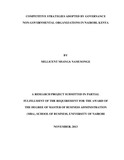| dc.contributor.author | Namusonge, Millicent M | |
| dc.date.accessioned | 2013-11-25T14:57:10Z | |
| dc.date.available | 2013-11-25T14:57:10Z | |
| dc.date.issued | 2013-11 | |
| dc.identifier.citation | Degree Of Master Of Business Administration | en |
| dc.identifier.uri | http://erepository.uonbi.ac.ke:8080/xmlui/handle/123456789/60168 | |
| dc.description | A research project submitted in the partial fulfillment of the requirement for the award Of Degree Of Master Of Business Administration, School Of Business, University Of Nairobi | en |
| dc.description.abstract | A company has competitive advantage whenever it has an edge over its rivals in securing customers and defending against competitive forces. Firms respond to competition in different ways. Some may opt to move into product improvement, some into divestiture and diversification, while others enter into new markets and others merge or buy out competitors. The non-profit organizations in Kenya are under increasing pressure to meet their organizational objectives and goals. This is not easily attainable without a good sense of the competitive strategies that can be practically applied to mitigate against financial challenges and cut throat competition for resources that make self-reliance a mirage to many. The problem escalates when the donors to the NGOs prefer to fund specific humanitarian emergencies such as food insecurity, health care or outbreak of such other natural calamities. Our study focused on investigating competitive strategies adopted by governance Non-Governmental Organizations in Nairobi Kenya. The study employed a descriptive cross-sectional survey. Descriptive cross-sectional survey is a comprehensive design that enables large and diverse amounts of data to be collected within a short time frame and analysed quantitatively, giving a credible presentation of results. The research was conducted on a sample of 35 respondents from different Non-Governmental Organizations to which questionnaires were administered. The findings show that the main competitive strategies adopted by the Governance Non-Governmental Organizations in Nairobi include quality of services offered, lead time is necessary, costs and flexibility. some factors that influence choice of competitive strategy include; changing donor funding patterns; quest to remain relevant; quest for sustainability; limited financial resources. The study recommends that NGOS should focus on clients’ since this can lead to the adoption of different approaches to various actors in the NGO environment. It is a signal towards their target audience, their beneficiaries, and their donors. | en |
| dc.language.iso | en | en |
| dc.publisher | University of Nairobi | en |
| dc.title | Competitive Strategies Adopted by Governance Non-governmental Organizations in Nairobi, Kenya | en |
| dc.type | Thesis | en |
| local.publisher | School of Business | en |

